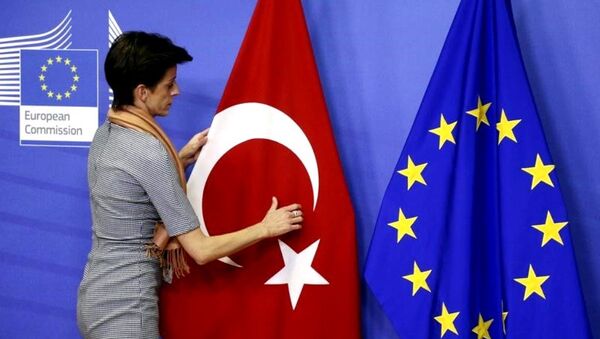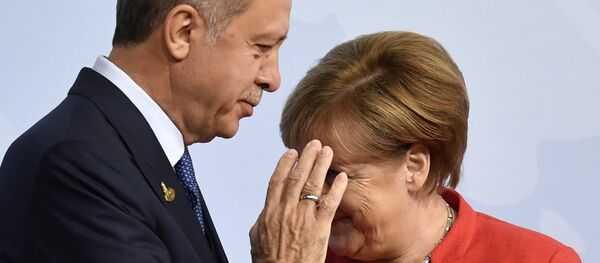"We are no longer surprised by any statement made by EU member states. We understand what they are trying to achieve," AK Party lawmaker Mehmet Metiner said.
He added that despite Ankara attaching importance to "the European direction," the statements made by EU leaders indicate their attempts to deceive and pressurize Turkey.
"They need to make a final decision, since Turkey does not accept methods of political manipulation. We have been waiting for EU membership for many years. If they intend to accept us, then let them do so; if not, then let them make a decision, inform us about it, and we will go our own way," he said.
Metiner blamed Brussels for using the issue of Turkey's EU membership as an instrument for putting pressure on Ankara, which he said is "an unacceptable position."
Halting Turkey's EU accession talks would be suicide, EU Minister Çelik says https://t.co/6Yjy14QUib #EU #Turkey pic.twitter.com/Xq3lgFq2Pu
— L'Tugba (@Twoobaa) 25 октября 2017 г.
He also hit out at a recent statement by European Council President Donald Tusk, who referred to the state of emergency in Turkey and its human rights record, saying that "we want to keep the door open for Ankara, but the current realities in Turkey make it difficult to fulfil."
"What realities he is talking about? What EU member state would behave differently, if it faced the terrorist threat Turkey is facing? In France, after a series of terrorist attacks, the state of emergency continues to persist for several years now. If Germany saw a coup attempt, what would the country's authorities do?" Metiner said.
According to him, "the current situation in Turkey cannot hamper its accession to the EU."
Vague Prospect
Turkish political analyst Sezgin Mercan, for his part, told Sputnik that the prospect of Turkey joining the EU is extremely vague, given the current crisis in relations between Brussels and Ankara.
Turkish president Erdogan says Turkey's EU accession could cure European chronic problems https://t.co/E1piu6p34x pic.twitter.com/9RY5cycDBM
— China Xinhua News (@XHNews) 23 октября 2017 г.
He recalled that since the beginning of bilateral talks in 2014, many waited for rapprochement between Turkey and the EU, but to no avail.
"On the contrary, the two sides further distanced themselves from each other. It was sparked by the regional and international crisis, the deadlock within the EU itself, as well as Turkey's domestic political realities. All this resulted in what we see today — discussions about the need to suspend the [Turkey-EU] negotiating process," Mercan said.
The expert urged both sides to "cope with the current crisis by showing a constructive approach to the issue."
Separately, he pointed to the results of the latest opinion polls, which indicated that in Turkey, up to 80 percent of residents do not want their country to pursue EU membership.
#Erdoğan to #EU leaders:Turkey’s accession will solve EU’s problems😳
— Marios Karatzias (@MariosKaratzias) 23 октября 2017 г.
Any European leader to answer?https://t.co/ivq5aUnnqy… via @HDNER pic.twitter.com/NhmqpPb8XG
He said that the number of those who support Turkey within the EU had also nose-dived, adding that "the latest crisis and constant tension dealt a serious blow to the attempts of Brussels and Ankara to establish a dialogue."
When asked why the EU wants to keep the door open for Turkey, Mercan referred to the bureaucratic structure of the EU. He noted that the decision-making process on accepting new members should be discussed independently of EU member states.
Mercan cited moves made by a number of EU countries, including Germany, Austria and the Netherlands, which he said "exacerbate the tension in relations with Turkey."
"In spite of this, one should remember that the European Commission wants Turkey's membership in the EU. This is due to the fact that the successful completion of the negotiation process is a criterion for the success of the European Commission itself," he concluded.
Speaking at last week's EU summit, European Commission President Jean-Claude Juncker cast doubt on the prospect of Turkey's accession to the EU, a stance that was preceded by his remarks in late August, when he said that Turkey is "moving away in giant strides from Europe."
In March 2016, the EU and Turkey agreed that Syrian refugees arriving in Greece would be returned to Turkey if their claim for asylum was rejected, while Syrian asylum seekers in Turkey would be resettled in Europe on a one-for-one basis.
In return, Ankara received $6.4 billion in financial aid and major concessions on EU membership and travel.





